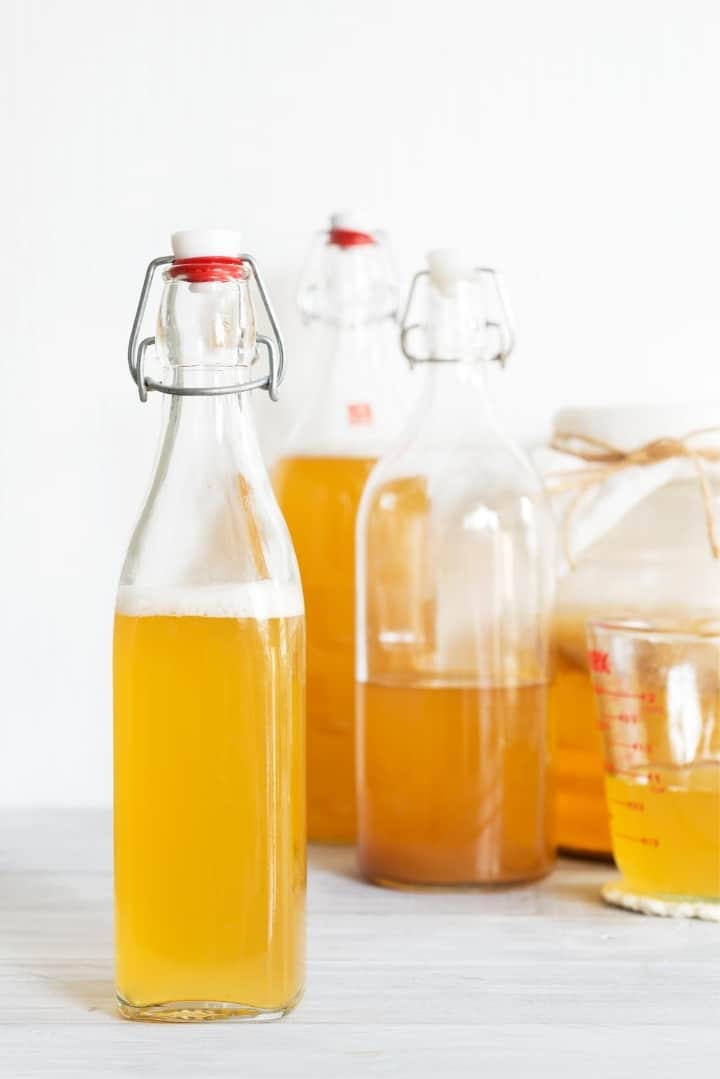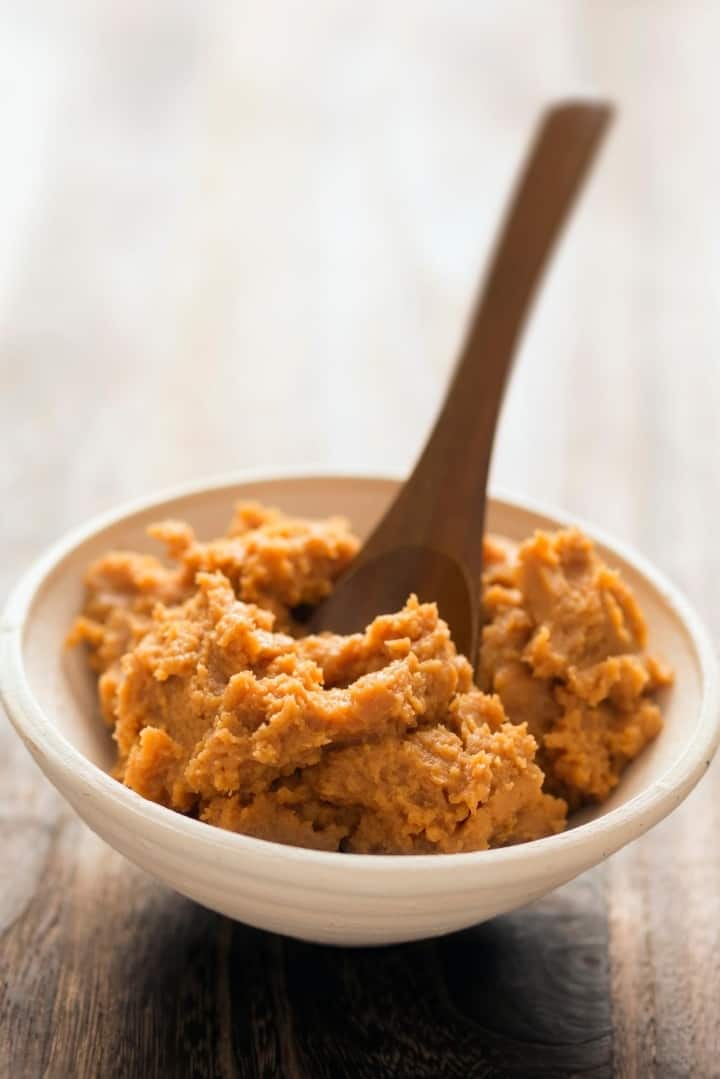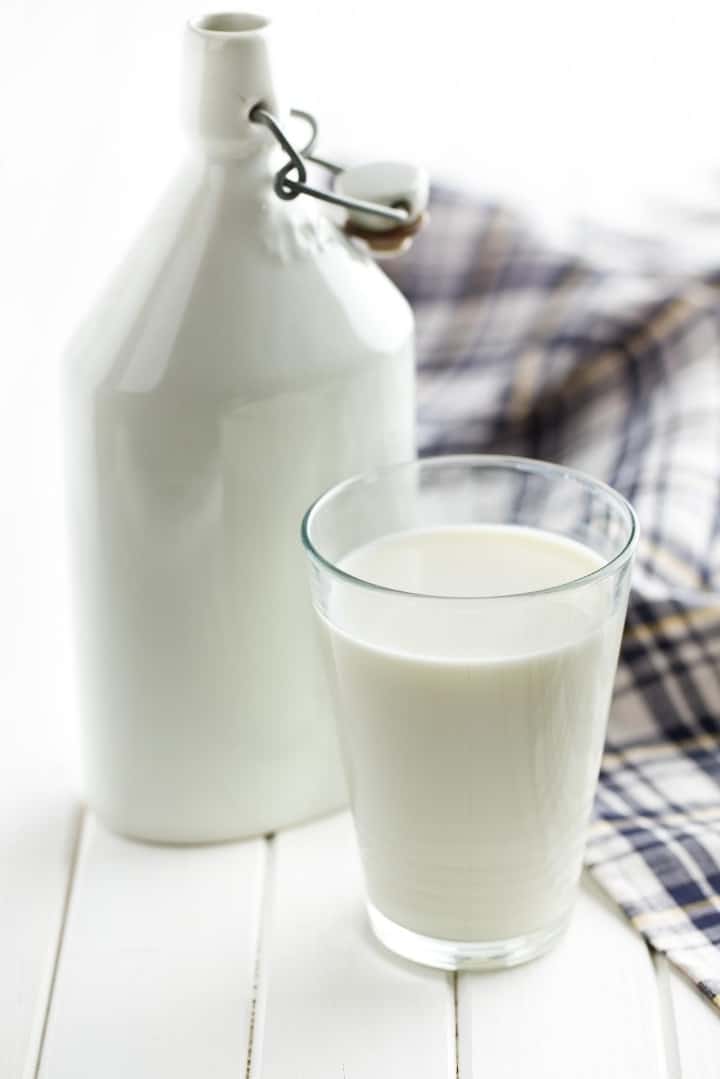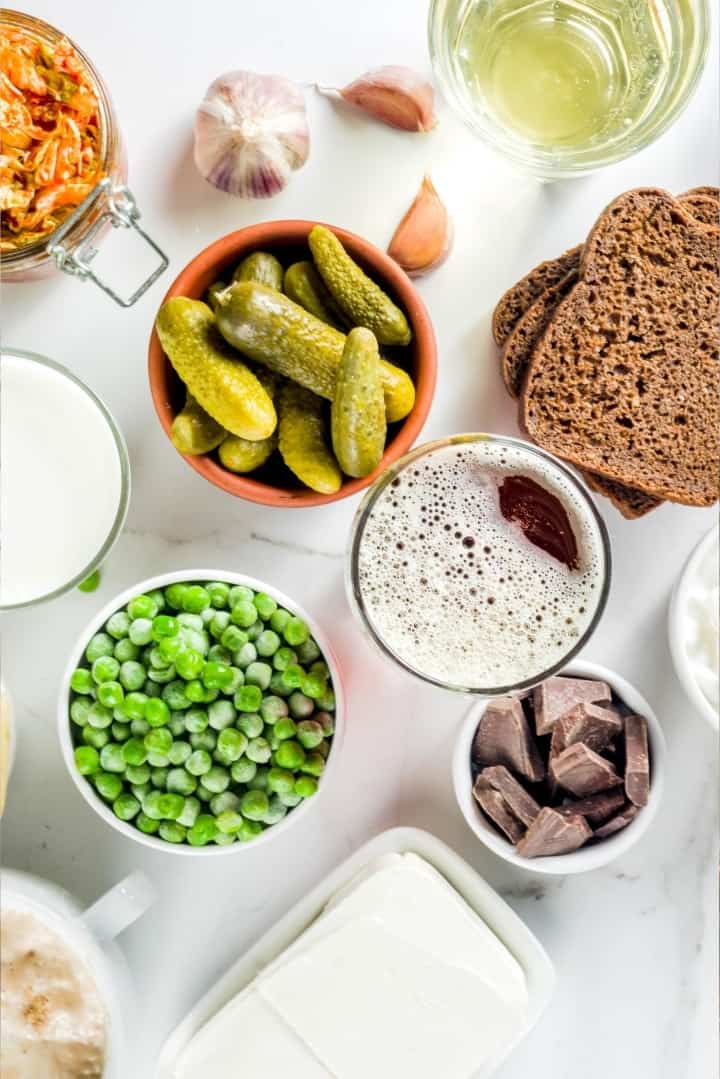Are you looking to promote a healthy digestive system and feel awesome? Eating fermented foods is an excellent way to do it. Add these 10 Best Fermented Foods to your diet and see the amazing benefits!
Sometimes people hear the words "fermented foods," and they aren’t sure what they are. But then you mention yummy sour pickles and creamy, rich yogurt – you've got it, they are fermented. There are a lot of foods out there that are fermented.
Basically, foods are fermented through a natural process. Microorganisms convert carbs (like sugar and starch) into alcohol or acids. This process helps food to last longer, and in some cases, the nutrient value is changed. For example, with some grains, when fermentation takes place, the level of folate increases.
But not only that, fermentation enhances the taste of foods (always a good thing in my books!). I’m thinking about sauerkraut again as the ideal example. Cabbage can seem sometimes boring and hard to digest, but when fermented, it turns into tart and tasty sauerkraut. And sauerkraut is so good for you, folks! Did you know? I’ve explained it all here in the 9 Benefits of Sauerkraut.
Kefir is another terrific case in point. Add this yogurt-like cultured dairy product to a delicious protein smoothie, and you've got a super-nutritious meal.
Fermenting leads to the creation of probiotics, too. Probiotics are a real game-changer when it comes to gut health. The formation of probiotics is what occurs in the making of yogurt. And you know that, often, when you are on a prescription of antibiotics for an illness, it’s recommended to eat yogurt to rebuild the bacteria in your gut.
Let’s look further into the 10 best fermented foods so you can get started with adding them to your diet right away.

WHY WE FERMENT FOOD
I’m not really giving you a history lesson, but it’s interesting to take a look at fermentation and how it all came about. The process is a pretty ancient one and basically started as a way to enhance the longevity of food and drinks. Before the days of refrigeration, food would spoil pretty quickly. In fact, it’s thought that the first cases of fermentation were yogurts produced in goat bags carried on the back of camels in the desert, around 10,000 BC. In Asia, fermentation was in place in 4,000 BC for grain-based beverages like rice wine. Skip to the 1800s, and chemist Louis Pasteur connected fermentation and yeast.
Today, we still ferment foods to extend shelf life. But the knowledge about probiotics and their link to health is ever-evolving. Foods must contain the right type of probiotics to still be active by the time they reach your gut. There have to be enough bacteria present to do the work, and importantly, the product you buy has to have been appropriately produced so the fermentation is effective.
So, it’s been a bit of a journey. And now, fermented foods are really coming into their own these days. I think it’s all because people realize a clean eating, healthy living lifestyle is the best. Although the consideration that fermented foods were good for you came to light somewhere around 1910, in the last 40 years, more research has been conducted on the benefits.
The health benefits of fermented foods, as proven by science, mean anti-inflammatory, anti-diabetic, anti-oxidant, and even blood pressure improvements. Fermented food is highly digestible and have a high concentration of vitamins and minerals. Bring on the fermented food!

IS APPLE CIDER VINEGAR CONSIDERED A FERMENTED FOOD?
Apple cider vinegar is indeed a fermented food, but it does not have probiotics, as yogurt does. Instead, beneficial gut bacteria form. Apple cider vinegar goes through the fermentation process twice - first, to change the apples to a cider with alcohol, and then into vinegar.
Apple cider vinegar has tons of benefits! In fact, I’ve detailed 19 benefits of apple cider vinegar in a post that will really amaze you ←- not kidding! Think about it. This easily consumed fermented food reduces inflammation, reduces belly fat, improves hair health, and helps you lose weight. You’ve gotta read the post, my friends!
Apple cider vinegar also has a lot of nutrients. And it has antioxidants and only 3 calories per tablespoon. It’s a little powerhouse that goes a long way.
WHICH FERMENTED FOODS CONTAIN THE MOST PROBIOTICS?
Well, we all know that yogurt is right up there when it comes to probiotic content. When eating yogurt, though, be sure to go for full-fat, plain Greek yogurt for maximum digestive aid. Full-fat dairy has many things going for it and can even help you lose weight if that’s your goal.
Some of the other foods with probiotics are kefir, miso, and kimchi. But more about those foods in a bit!
Keep this in mind, though, when buying fermented foods. You’ve got to check that the foods were not pasteurized because this can kill the bacteria that make the fermented food so good. Check the label when purchasing your sauerkraut and kimchi, for instance.
However, with yogurt, the milk has been pasteurized, but the bacterial cultures are added after. So, that's the difference.

HOW MUCH FERMENTED FOODS SHOULD I EAT DAILY?
If you are talking sauerkraut, as little as a tablespoon per day is beneficial to your health. But, there are not a whole lot of guidelines out there for specific quantities. In fact, Daily Food Guides world-over typically do not have a specific category for fermented foods.
Tim Spector, Professor of Genetic Epidemiology at King's College London, and author of 'The Diet Myth: The Real Science Behind What We Eat' feels that adding fermented foods to your diet in moderation is key.
It’s important to start with a small amount, such as a tablespoon of sauerkraut per day, to allow your body time to adjust. Adding fermented foods too quickly may result in loose stools, constipation, or stomach upset. And your taste buds need to adjust, too! Not everyone likes the sour and tart taste of some fermented foods, and it takes time to get used to it.
Start eating a little bit, but often, as opposed to a huge portion at one sitting. Eat a variety of fermented foods, and don’t stick to just one. And when you can, try fermenting foods on your own!
WHAT EXAMPLES OF FERMENTED FOODS ARE GOOD FOR YOUR DIET AND GUT?
Fermented foods that are high in probiotics are good for your diet and gut. They'll have healthy bacteria that provide optimal care and function of the digestive system. While the foods are fermenting, the good for you bacteria is increasing. I'm going to delve into the 10 best fermented foods below but I will say, fermented foods are awesome and fabulous for your health!
Think of recipes with Greek yogurt and thirst quenching drinks like Kombucha, and you'll be on the right track. Keep reading for a breakdown of food, item by item!

DO FERMENTED FOODS IMPROVE GUT HEALTH?
Yes, one of the best things about eating fermented foods is the benefit to gut health. It’s interesting to know that the gut is often called the “forgotten organ” because we don’t really think about how important it is to overall health.
Here's how fermented foods improve gut health:
- Improve digestive health: Probiotics in the form of good-for-you bacteria promote improvements in the function of the intestine. Nutrient absorption is positively affected, and the intestinal barrier function is protected.
- Boost your immune system: The bacteria that live in your digestive system impact your immunity. Fermented foods can give you a boost and help ward off illness. The vitamins in these foods can also help you feel better faster when you do get sick.
- Aid in digestion: Fermented foods are easier to digest. Nutrient absorption is enhanced in fermented foods. Additionally, foods like beans are broken down and digested easier when fermented.
- Relieve symptoms of digestive disorders: People who have illnesses like irritable bowel syndrome may find symptoms like bloating and gas are somewhat relieved by fermented foods.

WHAT ARE THE TOP 10 FERMENTED FOODS?
1. PROBIOTIC YOGURT
Yogurt is probably the item on the list that is most familiar to everyone. Not only does yogurt improve bone mineral density, but it also contains good for you nutrients like calcium, potassium, and vitamin B12. And did you know that yogurt is good for type 2 diabetes prevention? Remember to buy full-fat plain Greek yogurt as opposed to brands that claim to be low-fat, because full-fat dairy is healthy, but sugar is not. Get started with healthy dairy fermentations by making your favorite smoothie!
2. SAUERKRAUT
So, you know from my post about the benefits of sauerkraut that this is a fermented food that you should eat. It’s pretty versatile and has lots of vitamins and even antioxidants. Just remember, as with all fermented foods, start out in moderation, to give your body time to adjust to eating it.
3. KIMCHI
Kimchi is most often made with cabbage, just like sauerkraut is. It is usually made with radishes, too, and topped with seasonings like ginger (read about how good ginger is for you!), garlic, and spring onions. Studies with participants with prediabetes show it decreases insulin resistance and can lower blood pressure. You can also look for kimchi with fermented vegetables like daikon radish and carrots.
4. KOMBUCHA
Kombucha is a fermented tea. Found in the grocery store and natural food shops, this often sour drink typically contains 0.5 percent alcohol by volume. This fermented beverage is pretty tasty, and there have been studies done on the benefits. One study states kombucha may be useful in prostate cancer treatment and prevention.

5. NATTO
Natto is made from combining salt, koji and fermented soybeans, and studies show that fermented soy can have an effect against neurodegenerative diseases like Parkinson's and Alzheimer's diseases. As well, the fiber factors in as a double bonus along with the fermentation benefits. Fiber is like a work out for your intestines, cleaning and brushing as it moves along. So, Vitamin K-rich natto (which has a strong flavor) is another fermented food to add to the list. It is typically served at breakfast and is a staple in Japan.
6. MISO
Japanese cuisine has got it right. Miso is also made with fermented soybeans but is a common seasoning in things like miso soup, miso paste, dressings, and meat marinades. There are lots of studies on the goodness of miso, including a lower risk of stroke and the regulation of blood pressure.

7. TEMPEH
Again, we see soybeans. In this case, the soybeans are used as a meat substitute. They’re high in protein after all, and form into a cake-like shape. It’s similar to tofu but is firmer and nuttier. Tempeh is thought to reduce the presence of free radicals, which often lead to chronic disease.
8. KEFIR
Kefir is compared to the taste and texture of drinkable yogurt. It’s easier to digest for those with lactose intolerance and is often added to smoothies. Kefir comes with a ton of benefits, including reducing inflammatory markers and aiding in bone health. How is kefir made? Kefir grains, which have lactic acid bacteria and yeast, are added to milk.
9. APPLE CIDER VINEGAR
We talked about amazing apple cider vinegar above, and I'll fill you in a bit more here. I didn't mention the mother, after all and I've got to do that! What is the mother you ask? ACV that is murky and a bit dark contains the mother, and is unrefined and unfiltered. The good cultures and beneficial bacteria are present, meaning tons of benefits. I give you lots of helpful info in my video, Apple Cider Vinegar For Weight Loss | Can It Really Reduce Belly Fat? too! To add this fermented food to your day, combine apple cider vinegar, dijon mustard, raw honey and olive oil. Toss with lettuce and veggies for a delicious salad dressing.
10. SOURDOUGH BREAD
Sourdough bread is typically listed in the top 10 fermented foods because it is fermented naturally, including processes of fermentation by lactic acid bacteria and naturally occurring yeasts. It's pretty cool also that sourdough bread is known to be easier to digest and is suitable for those with gluten allergies (mind you, you'll need to use the right flour - get the scoop on flour from me right here).
WHAT ARE NATURALLY FERMENTED FOODS?
Sauerkraut, kimchi, kefir – these are all naturally fermented foods. In fact, all fermented foods can be considered fermented in a natural way and foods that are fermented through natural processes are the best. You want to look for labels that state "naturally fermented" when buying these foods.
You see, if there are no live organisms and the food was hurried along in the process (as is the case in some pickles, for example), you will not get the all important probiotics. Just a tip as you shop to stock your shelves with the best fermented foods!
WHAT IS THE BEST FERMENTED FOOD?
The best fermented food is the one that you like and will include in your diet on a daily basis. I think you can see in my list that there is a wide variety of tastes and textures going on here, so why not give one of these foods a try?
Start with one or two of the foods on this list for optimal health benefits resulting from consuming the microbes that line the gut, aiding in gut health. What could be better? Just don't go overboard and cause temporary bloating or gas. Bit by bit! You'll know as your body adjusts.
When you start to include these top 10 fermented foods in your diet, you will improve your gut microbiota by instilling live microorganisms, reduce the risk of cardiovascular disease, and improve your gastrointestinal health in so many ways!
MORE POSTS ON A HEALTHY LIFESTYLE
I'm sure, now that you know all about fermented foods, you'll want to learn about other beneficial foods and tips on leading a healthy lifestyle.
- 6 Easy Ways to Spot Hidden Sugar in Foods
- Top 12 Demonized Foods That Are Actually Good For You
- 10 Benefits of Green Tea
- How to Calculate Your Macros for Weight Loss
- 10 Benefits of Eggs and Why You Should Eat Them More Often
This post contains affiliate links for products I use regularly and highly recommend.



thank you
nice post thank you
Lori Finch
But soy is so bad for us, right?
Mark Brewer
There are some issues with soy bean lectins that have been discussed elsewhere (google it) as well as the issue of genetic modification. For the most part the lectin problem (which is not just limited to soybeans) is eliminated by heating and cooking. The GMO soybeans I would avoid completely.